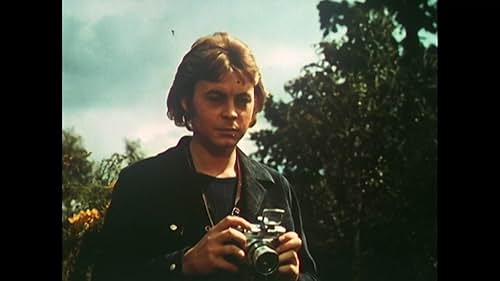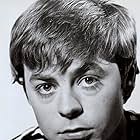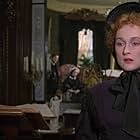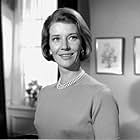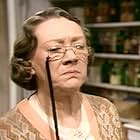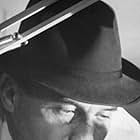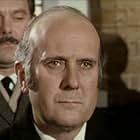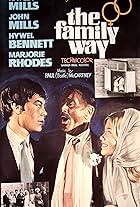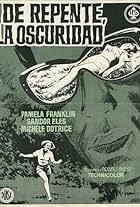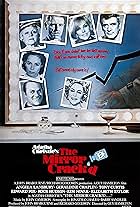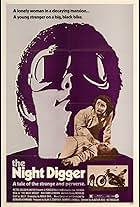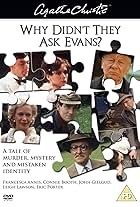PUNTUACIÓN EN IMDb
6,0/10
2,7 mil
TU PUNTUACIÓN
Un joven inglés de clase trabajadora se casa con una afable heredera americana, pero su felicidad conyugal se ve pronto interrumpida cuando empiezan a construir una casa en un terreno supues... Leer todoUn joven inglés de clase trabajadora se casa con una afable heredera americana, pero su felicidad conyugal se ve pronto interrumpida cuando empiezan a construir una casa en un terreno supuestamente maldito.Un joven inglés de clase trabajadora se casa con una afable heredera americana, pero su felicidad conyugal se ve pronto interrumpida cuando empiezan a construir una casa en un terreno supuestamente maldito.
- Dirección
- Guión
- Reparto principal
- Premios
- 1 nominación en total
Bob Keegan
- Innkeeper
- (as Robert Keegan)
Reseñas destacadas
The last film made by the illustrious Launder & Gilliat team is a psycho-thriller that desperately wants to be praised as "Hitchcockian" and even recruits Bernard Herrmann, Hitch's favourite composer, to write the score. Perhaps the Hitchcock film it most resembles, however, is "Frenzy" both seem to be the work of ageing filmmakers trying to get "with it".
"Endless Night" is extremely faithful to Agatha Christie's source novel (it may be the closest-ever filming of one of her novels) but neither of the two protagonists seem to come across with the same conviction that they do in the book. Hayley Mills struggles with a difficult part (Ellie is a fairly insipid character) while Hywel Bennett somehow never convinces as the enigmatic Michael.
There's lots of fun spotting familiar faces in the supporting cast, including an uncredited Nicholas Courtney (the Brigadier from "Doctor Who") as the auctioneer. Per Oscarsson is good as the insightful architect Santonix, who guesses something of what is going on, although our admiration for him is lessened by the hideously vulgar house he builds (which all the characters acclaim as a masterpiece!) I can't help wondering what Dame Agatha's loyal fans made of this film; the setting in an idyllic corner of rural England is traditional enough but the atmosphere is a great deal darker than usual. The novel, written in 1967, represented quite a bold departure for the writer (and a successful one) but the film at times descends into banality. Having said that, the twee nature of Ellie and Michael's romance gives the conclusion much more impact and the final images are startling.
"Endless Night" is extremely faithful to Agatha Christie's source novel (it may be the closest-ever filming of one of her novels) but neither of the two protagonists seem to come across with the same conviction that they do in the book. Hayley Mills struggles with a difficult part (Ellie is a fairly insipid character) while Hywel Bennett somehow never convinces as the enigmatic Michael.
There's lots of fun spotting familiar faces in the supporting cast, including an uncredited Nicholas Courtney (the Brigadier from "Doctor Who") as the auctioneer. Per Oscarsson is good as the insightful architect Santonix, who guesses something of what is going on, although our admiration for him is lessened by the hideously vulgar house he builds (which all the characters acclaim as a masterpiece!) I can't help wondering what Dame Agatha's loyal fans made of this film; the setting in an idyllic corner of rural England is traditional enough but the atmosphere is a great deal darker than usual. The novel, written in 1967, represented quite a bold departure for the writer (and a successful one) but the film at times descends into banality. Having said that, the twee nature of Ellie and Michael's romance gives the conclusion much more impact and the final images are startling.
Endless Night is one of those movies that is hugely flawed, and yet it sticks in the mind unlike many more polished movies. Extremely slow paced for much of it's length and with several sequences that feel almost unnecessary, and even a few which just seem wierd, the film than delivers a true knock out of a twist which makes one realise how well the story has been constructed. For this reason, in some respect it's more satisfying to watch the second time even if one is no longer surprised, because one can notice all the little clues that have been put in ,and many of the previously mentioned unnecessary or wierd bits seem more essential. There is, though, one huge red herring that seems rather pointless.
This was the last of the Hywell Bennett/Hayley Mills collaborations for the Boulting Brothers and it is possibly their most interesting. Cast are all excellent ,including George Sanders in one of his final roles, and this is just as well since the film is indeed extremely talky. The alternately eerie and romantic Bernard Herrmann score is very memorable, although they could have made sure Mills' singing voice [obviously dubbed] sounded like her normal voice.
Many will be unsatisfied with this film ,but try it if you fancy a somewhat different kind of thriller, even it's only really a thriller in the final half hour!
This was the last of the Hywell Bennett/Hayley Mills collaborations for the Boulting Brothers and it is possibly their most interesting. Cast are all excellent ,including George Sanders in one of his final roles, and this is just as well since the film is indeed extremely talky. The alternately eerie and romantic Bernard Herrmann score is very memorable, although they could have made sure Mills' singing voice [obviously dubbed] sounded like her normal voice.
Many will be unsatisfied with this film ,but try it if you fancy a somewhat different kind of thriller, even it's only really a thriller in the final half hour!
I won't say it's a bad film, but I have to believe the liberties taken with the adaptation of the story go well beyond the nudity and modern setting. (I will say that the house with the remote-controlled indoor swimming pool in the living room was a bit over the top.)
I will confess that I did not guess the direction the plot would take, but what was so disappointing was the profusion of loose ends and entirely pointless characters. Agatha didn't usually write them that way - everyone ended up with a role in the outcome of the story. Here we are presented with in-laws, neighbors, family friends, and a mysterious old woman --- all of whom have nothing at all to do with the resolution of the story. Most of them could have been omitted entirely and the story would have been essentially unchanged.
My DVD even featured an editing error: about 10 seconds of the film repeat precisely (when the girl's parents are observed getting back into their car to leave.)
There is also a broken window that is never explained, a ghostly appearance that is never accounted for or revisited, a car is observed to take an unusually long to get somewhere - but we are never given the significance. An architect seems to know things the audience does not -- yet no explanation is offered of how he knows them.
Like Agatha's best writing, characters and clues and complications pile up... but then they are inexplicably thrown away in favor of an unexpected, yet rather anticlimactic resolution.
I will confess that I did not guess the direction the plot would take, but what was so disappointing was the profusion of loose ends and entirely pointless characters. Agatha didn't usually write them that way - everyone ended up with a role in the outcome of the story. Here we are presented with in-laws, neighbors, family friends, and a mysterious old woman --- all of whom have nothing at all to do with the resolution of the story. Most of them could have been omitted entirely and the story would have been essentially unchanged.
My DVD even featured an editing error: about 10 seconds of the film repeat precisely (when the girl's parents are observed getting back into their car to leave.)
There is also a broken window that is never explained, a ghostly appearance that is never accounted for or revisited, a car is observed to take an unusually long to get somewhere - but we are never given the significance. An architect seems to know things the audience does not -- yet no explanation is offered of how he knows them.
Like Agatha's best writing, characters and clues and complications pile up... but then they are inexplicably thrown away in favor of an unexpected, yet rather anticlimactic resolution.
How old was Agatha Christie when she wrote this? Pushing 70? She was pretty old, about my age, and that might account for the tragic emotional tonus of this story.
You wouldn't know this was a Christie story if it weren't so advertised. True, there are some of the usual themes -- British class distinctions, extreme wealth, jealousy, poison -- but they are submerged by a love story that seems at first to be going nowhere fast. The story lacks any of the novelist's usual subtle wit.
No point in spelling out the plot in any detail. A poor chauffeur-for-hire meets a blond sylph and they fall for each other. He discovers that she is the sixth richest girl in the world, her coming-of-age party having been covered in the newspapers, and he rejects her because, as he says, "I have my pride." (The audience may be forgiven for a few muffled chuckles at this point.) She dies under mysterious circumstances while riding. In these circles, "riding" is taken to mean horseback riding. He inherits the money. And things thereafter go a little berserk without there being a hell of a lot in the way of motivation.
The film is narrated by the young man, Michael (Bennett). At first his story seems perfectly reasonable and he is presented as a fellow of principle if not money. Hayley Mills is introduced in a filmy white dress, her long blonde hair wafted by the breeze as she capers alone in a meadow, slender limbs, radiantly healthy, and -- well, you know the type. Eminently edible. But Michael's story, though it begins normally enough, describing the approach-avoidance conflict from which he suffers, being in love with Mills and yet resenting her wealth, gradually changes.
He becomes less and less reasonable, and less nice. He's impolite to Greta (Eklund), Mills' tutor and possessive friend. Greta is often described as "bossy" but frankly her supposed obsession with power isn't well shown. There is just one argument -- a slightly bitchy one -- between Greta and Michael over the placement of a more than usually ugly statue of a cat. What evidence we see of her bossiness is rather weak tea. If they're going to have a domineering German nurse, couldn't the nurse and Hayley Mills have had a little consensual flagellation or something? The climax seems to come out of thin air. A sudden unmotivated reversal of the character of Michael.
It's not a bad movie though. Romance, yes, but a romance filled somehow with uneasiness and a gradually growing sense of dread. And when I first watched this and heard the first few notes of the score, I thought, "OMG, the composer is ripping off Bernard Hermann note for note." It turned out to BE Hermann, and a very effective Hermann at that, full of an eerie melancholy.
Maybe the reason it leaves a viewer feeling sad is that Christie seems to be stretching her talent so much trying to achieve "significance." And for the first time I'm aware of, we actually care about the character who dies, whereas in previous stories the victim was nothing more than a stereotype who, once gone, was forgotten. The death was only a pivot on which the remainder of the story could turn. Here, it's really too bad.
You wouldn't know this was a Christie story if it weren't so advertised. True, there are some of the usual themes -- British class distinctions, extreme wealth, jealousy, poison -- but they are submerged by a love story that seems at first to be going nowhere fast. The story lacks any of the novelist's usual subtle wit.
No point in spelling out the plot in any detail. A poor chauffeur-for-hire meets a blond sylph and they fall for each other. He discovers that she is the sixth richest girl in the world, her coming-of-age party having been covered in the newspapers, and he rejects her because, as he says, "I have my pride." (The audience may be forgiven for a few muffled chuckles at this point.) She dies under mysterious circumstances while riding. In these circles, "riding" is taken to mean horseback riding. He inherits the money. And things thereafter go a little berserk without there being a hell of a lot in the way of motivation.
The film is narrated by the young man, Michael (Bennett). At first his story seems perfectly reasonable and he is presented as a fellow of principle if not money. Hayley Mills is introduced in a filmy white dress, her long blonde hair wafted by the breeze as she capers alone in a meadow, slender limbs, radiantly healthy, and -- well, you know the type. Eminently edible. But Michael's story, though it begins normally enough, describing the approach-avoidance conflict from which he suffers, being in love with Mills and yet resenting her wealth, gradually changes.
He becomes less and less reasonable, and less nice. He's impolite to Greta (Eklund), Mills' tutor and possessive friend. Greta is often described as "bossy" but frankly her supposed obsession with power isn't well shown. There is just one argument -- a slightly bitchy one -- between Greta and Michael over the placement of a more than usually ugly statue of a cat. What evidence we see of her bossiness is rather weak tea. If they're going to have a domineering German nurse, couldn't the nurse and Hayley Mills have had a little consensual flagellation or something? The climax seems to come out of thin air. A sudden unmotivated reversal of the character of Michael.
It's not a bad movie though. Romance, yes, but a romance filled somehow with uneasiness and a gradually growing sense of dread. And when I first watched this and heard the first few notes of the score, I thought, "OMG, the composer is ripping off Bernard Hermann note for note." It turned out to BE Hermann, and a very effective Hermann at that, full of an eerie melancholy.
Maybe the reason it leaves a viewer feeling sad is that Christie seems to be stretching her talent so much trying to achieve "significance." And for the first time I'm aware of, we actually care about the character who dies, whereas in previous stories the victim was nothing more than a stereotype who, once gone, was forgotten. The death was only a pivot on which the remainder of the story could turn. Here, it's really too bad.
"Endless Night" follows working-class freewheeling chauffeur Michael (Hywel Bennett) who falls in love with a billionaire heiress Ellie (Hayley Mills). The two marry, and build a large estate on property in the English countryside known as Gypsy's Acre, which is purported by locals to be cursed land. After Ellie's relative Greta (Britt Ekland) arrives to stay, a series of bizarre events unfold, including ominous encounters with an elderly gypsy woman who roams the property.
Based on the Agatha Christie novel, director Sidney Gilliat takes the meat of Christie's novel and puts unique twinges on it that are reminiscent of Hitchcock (Bernard Herrmann's spooky score understates this). The film is admittedly slow, especially in exposition, and there are few quote-unquote thrills to be had, but I found this film strangely compelling in spite of its odd pacing.
There is a consistent sense of unease that permeates nearly every scene, although it's difficult to put your finger on what is exactly the cause. The photography in the film is fantastic, capturing the rolling landscapes and the cloudy skies surrounding the manor; this is punctuated by subtle scares that come in the form of various figures lurking below on the hillsides or in the woods, almost like indistinct figures in a painting. The film is at times reminiscent of English Gothic in its aesthetics, even though the house itself is very much "retro '70s" in both style and furnishings.
Solid performances from Hywel Bennett and Hayley Mills really shine here, with Mills being especially memorable as a good natured girl who happens to be a billionaire ("world's sixth richest!"). Britt Ekland is also great as the stalwart and fawning relative— her performance really comes full circle in the finale, which provides her the bulk of the role's dynamics, and she handles it fabulously. The conclusion to the film is fairly routine by contemporary standards, although I can honestly say that I didn't see the plot twists coming, so props to Christie and the filmmakers' handling of the material— I was definitely had by the film.
Overall, "Endless Night" is an enjoyable and well-acted picture that seems to have been forgotten in time. It is too slow to qualify as a full-blooded thriller, but there are tinges of a British psychothriller here with some genuinely bizarre and eerie moments that stand out among effective cinematography and a disquieting score. In spite of the film's lackluster pacing, it is unexpectedly transfixing, and manages to hold one's attention until the head twisting finale. 7/10.
Based on the Agatha Christie novel, director Sidney Gilliat takes the meat of Christie's novel and puts unique twinges on it that are reminiscent of Hitchcock (Bernard Herrmann's spooky score understates this). The film is admittedly slow, especially in exposition, and there are few quote-unquote thrills to be had, but I found this film strangely compelling in spite of its odd pacing.
There is a consistent sense of unease that permeates nearly every scene, although it's difficult to put your finger on what is exactly the cause. The photography in the film is fantastic, capturing the rolling landscapes and the cloudy skies surrounding the manor; this is punctuated by subtle scares that come in the form of various figures lurking below on the hillsides or in the woods, almost like indistinct figures in a painting. The film is at times reminiscent of English Gothic in its aesthetics, even though the house itself is very much "retro '70s" in both style and furnishings.
Solid performances from Hywel Bennett and Hayley Mills really shine here, with Mills being especially memorable as a good natured girl who happens to be a billionaire ("world's sixth richest!"). Britt Ekland is also great as the stalwart and fawning relative— her performance really comes full circle in the finale, which provides her the bulk of the role's dynamics, and she handles it fabulously. The conclusion to the film is fairly routine by contemporary standards, although I can honestly say that I didn't see the plot twists coming, so props to Christie and the filmmakers' handling of the material— I was definitely had by the film.
Overall, "Endless Night" is an enjoyable and well-acted picture that seems to have been forgotten in time. It is too slow to qualify as a full-blooded thriller, but there are tinges of a British psychothriller here with some genuinely bizarre and eerie moments that stand out among effective cinematography and a disquieting score. In spite of the film's lackluster pacing, it is unexpectedly transfixing, and manages to hold one's attention until the head twisting finale. 7/10.
¿Sabías que...?
- CuriosidadesThis British movie was much more popular in Italy than in Britain. Executive Producer, Writer, and Director Sidney Gilliat expressed admiration for the Italian title - which translates as "Champagne After the Funeral" - and wished he had thought of it for a British title.
- PifiasWhen Michael Rogers is driving into Amsterdam the sign mentions a town Shertogenbosch, it should be written 's-Hertogenbosch. The town of Zwindrecht is also misspelled, it should be Zwijndrecht. The layout of the cities/towns doesn't make much sense in terms of Dutch Geography.
- Citas
Lippincott: [introducing himself] I am that figure of fiction, the family lawyer.
- ConexionesFeatured in Agatha Christie: La mujer del misterio (2007)
- Banda sonoraEndless Night
(uncredited)
Sung by Caroline Gilliat
[The song Ellie (Hayley Mills) sings while she plays the piano, and played during the end credits]
Selecciones populares
Inicia sesión para calificar y añadir a tu lista para recibir recomendaciones personalizadas
- How long is Endless Night?Con tecnología de Alexa
Detalles
- Fecha de lanzamiento
- País de origen
- Sitio oficial
- Idioma
- Títulos en diferentes países
- Noche sin fin
- Localizaciones del rodaje
- Albergo San Pietro, Positano, Salerno, Campania, Italia(Italian scenes film at The Albergo San Pietro, Positano)
- Empresas productoras
- Ver más compañías en los créditos en IMDbPro
Contribuir a esta página
Sugerir un cambio o añadir el contenido que falta

Principal laguna de datos
By what name was La noche sin fin (1972) officially released in India in English?
Responde
